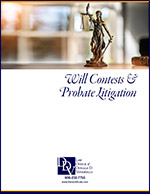Will Contests and Probate Litigation
(Continued)
IV. Claims Against Estate Fiduciaries
Claims against fiduciaries fall into two broad categories: lawsuits by beneficiaries and lawsuits by third parties.
1) Actions by Beneficiaries Against Fiduciaries
Fiduciary Misconduct On occasion, beneficiaries or creditors of an estate may take issue with the actions of a fiduciary and make claims based upon the fiduciary’s alleged breach of duty, self-dealing or negligence. Such claims arise not only in the administration of trusts or decedents’ estates, but also in cases involving conservatorships, guardianships and powers of attorney. Attorneys with Vanarelli & Li, LLC both defend fiduciaries against which claims are made, and prosecute such claims on behalf of beneficiaries and estate creditors.
Surcharge Actions Claims are sometimes made that a fiduciary has committed fraud or other wrongdoing, resulting in loss to an estate or trust. In such cases, a court may surcharge the fiduciary for breach of fiduciary duty, and order the fiduciary to repay the estate or trust from personal assets. Attorneys with Vanarelli & Li, LLC represent beneficiaries bringing such claims, as well as fiduciaries defending against claims for surcharge.
2) Actions by Third Party Fiduciaries
Claims by third parties may arise in a number of ways: claims relating to a decedent’s conduct before death, for which the estate remains liable; claims based on contracts entered into by a fiduciary in his fiduciary capacity; and claims by creditors of the estate.
V. Abuse of a Power of Attorney
A power of attorney is a document used to delegate legal authority to act on another person’s behalf. The principal (the person granting the power of attorney) gives the agent (also known as the attorney-in-fact,) the authority to make legal decisions on his/her behalf, including managing bank accounts, real estate, and other assets. The potential for fraud exists in every power of attorney arrangement, through self-dealing, embezzlement, and unlawful gifting. In some situations, a power of attorney holder will significantly deplete an estate, leaving the heirs with little or no inheritance. Other ways in which a power of attorney can be abused include changing beneficiary designations on life insurance or annuities, and opening bank accounts with joint title or pay-on-death provisions in favor of the agent. The potential for power of attorney abuse is great, and can lead to lawsuits. The creation of a power of attorney can be challenged on the basis that the principal lacked mental capacity to understand and sign the the document, and that the creation of the document did not follow proper formalities. If a validly granted power of attorney has been abused by the agent, grounds may exist to sue the agent for the return of embezzled property or for monetary damages. If the principal is still living at the time of the action, the principal can sue the agent directly. In many situations, the power of attorney abuse is part of a broader pattern of elder abuse. If the principal has passed away by the time the power of attorney abuse has been discovered, the principal’s estate or the intended beneficiaries of the property may be able to sue the agent for breach of fiduciary duty, tortious interference with estate planning, improper interference with expected inheritance or a number of other causes of action.
VI. Joint Account Litigation
In some situations, the ownership of joint bank accounts will be in dispute upon the death of one owner. Under New Jersey law, there is a presumption that jointly titled accounts become the property of the survivor upon the death of the first owner. However, this presumption can be disproven upon sufficient evidence to the contrary. In other situations, one owner of joint funds might have improperly transferred funds out of the joint account. In such a case, a lawsuit can be brought for the recovery of the joint funds improperly taken.
VII. Accounting Actions
A fiduciary – an executor, administrator, trustee or agent under a power of attorney – holds a position of trust and confidence. Because the fiduciary acts for the benefit of others, he or she must account for his or her actions. A fiduciary’s administration of an estate or trust is not concluded until the fiduciary submits a final accounting. It is the fiduciary’s duty to maintain and preserve accurate records of his or her actions. If the fiduciary is unable to prove or verify the fiduciary account, any doubts or irregularities will be decided against the fiduciary. Any beneficiary or other interested party may seek to compel a fiduciary to account formally by filing the accounting via Order to Show Cause in court.
Vanarelli & Li, LLC will assist beneficiaries with petitioning the court for accountings, and will prepare accountings for fiduciaries who are required to submit such accountings. Because of their extensive experience, the trusts and estates attorneys with Vanarelli & Li, LLC are well equipped to review and prepare accountings to ensure that our client’s interests are protected. If necessary, our litigators are prepared to question or defend fiduciaries and their accountings in court. Trusts and Estates attorneys with Vanarelli & Li, LLC engage in sophisticated planning and administration of estates, trusts, conservatorships and guardianships. Our trusts and estates lawyers are frequently retained by fiduciaries to deal with complicated tax, estate and trust issues. Because of their experience and knowledge, our trusts and estates lawyers bring a comprehensive understanding to the intricate issues of trusts and estates law. Working together, litigators and trusts and estates lawyers with Vanarelli & Li, LLC bring the requisite experience and knowledge to a wide range of estate and probate litigation, and contested guardianship matters.
VIII. Elder Abuse Actions
Please see link below.
Additional Information
For additional information regarding Will Contests and Probate Litigation, call us at 908-232-7400 or click here to contact us online.









Vanarelli & Li, LLC on Social Media